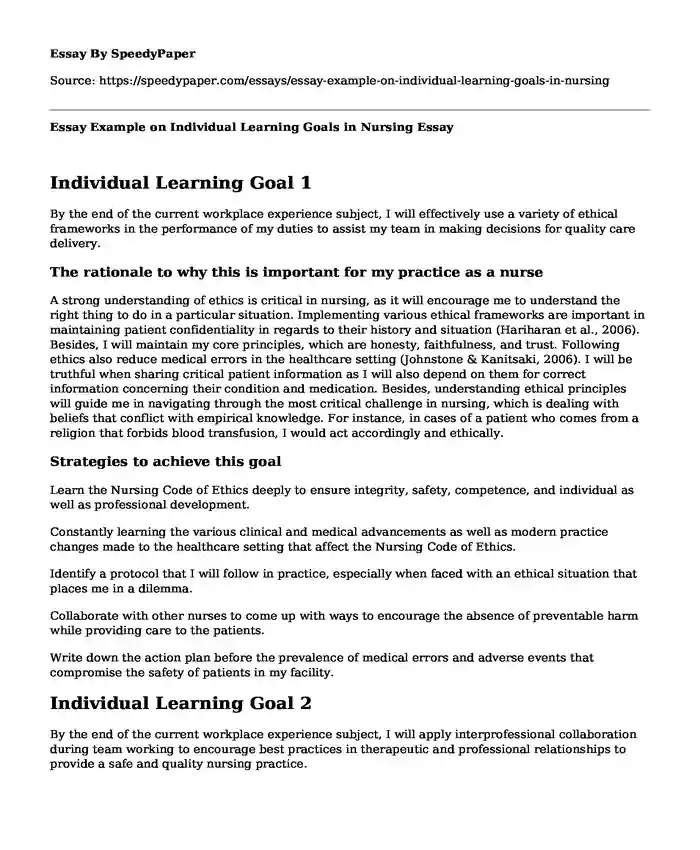Individual Learning Goal 1
By the end of the current workplace experience subject, I will effectively use a variety of ethical frameworks in the performance of my duties to assist my team in making decisions for quality care delivery.
The rationale to why this is important for my practice as a nurse
A strong understanding of ethics is critical in nursing, as it will encourage me to understand the right thing to do in a particular situation. Implementing various ethical frameworks are important in maintaining patient confidentiality in regards to their history and situation (Hariharan et al., 2006). Besides, I will maintain my core principles, which are honesty, faithfulness, and trust. Following ethics also reduce medical errors in the healthcare setting (Johnstone & Kanitsaki, 2006). I will be truthful when sharing critical patient information as I will also depend on them for correct information concerning their condition and medication. Besides, understanding ethical principles will guide me in navigating through the most critical challenge in nursing, which is dealing with beliefs that conflict with empirical knowledge. For instance, in cases of a patient who comes from a religion that forbids blood transfusion, I would act accordingly and ethically.
Strategies to achieve this goal
Learn the Nursing Code of Ethics deeply to ensure integrity, safety, competence, and individual as well as professional development.
Constantly learning the various clinical and medical advancements as well as modern practice changes made to the healthcare setting that affect the Nursing Code of Ethics.
Identify a protocol that I will follow in practice, especially when faced with an ethical situation that places me in a dilemma.
Collaborate with other nurses to come up with ways to encourage the absence of preventable harm while providing care to the patients.
Write down the action plan before the prevalence of medical errors and adverse events that compromise the safety of patients in my facility.
Individual Learning Goal 2
By the end of the current workplace experience subject, I will apply interprofessional collaboration during team working to encourage best practices in therapeutic and professional relationships to provide a safe and quality nursing practice.
The rationale to why this is important for my practice as a nurse
Collaboration is important for my practice, as it will ensure that I deliver improved patient care and outcomes. I will gain a uniquely comprehensive and holistic view of the patient that aligns with that of my teammates. Collaboration also assists in the reduction of medical errors in healthcare settings (Fleischmann et al., 2016). Group conversation through collaboration would be important in letting the entire setting have the most important information required to treat patients safely. I would reduce the errors that arise from the missed symptoms and poor dosage or diagnosis of patients. The interprofessional collaboration will also let me begin my treatment actions promptly. For instance, there would be no lags in the delivery of information required to attend to a given patient due to patients waiting for nurses and nurses waiting for the top management to offer consultations. Team working also lets everyone in the workplace to be viewed equally in terms of the roles mandated on the care team (Weller et al., 2011). Working as a group would boost my morale and encourage my retention in the workplace.
Strategies to achieve this goal
Encourage and participate in team-based and patient-centered rounds that comprise various staff within the setting.
Take advantage of the various means of communication, including text, voice, and video methods applicable in the existing hospital communication strategies to foster teamwork.
Identify a communication channel that would avoid multiple doctors prescribing different dosages or nurses performing care delivery differently to one patient.
Avoid patient frustration by involving them in the team for them to provide sufficient and concise information relevant to their care.
References
Fleischmann, N., Tetzlaff, B., Werle, J., Geister, C., Scherer, M., Weyerer, S., Hummers-Pradier, E., & Mueller, C. A. (2016). Interprofessional collaboration in nursing homes (interprof): A grounded theory study of general practitioner experiences and strategies to perform nursing home visits. BMC Family Practice, 17(1). https://doi.org/10.1186/s12875-016-0522-z
Hariharan, S., Jonnalagadda, R., Walrond, E., & Moseley, H. (2006). Knowledge, attitudes, and practice of healthcare ethics and law among doctors and nurses in Barbados. BMC Medical Ethics, 7(1). https://doi.org/10.1186/1472-6939-7-7
Johnstone, M., & Kanitsaki, O. (2006). The ethics and practical importance of defining, distinguishing, and disclosing nursing errors: A discussion paper. International Journal of Nursing Studies, 43(3), 367-376. https://doi.org/10.1016/j.ijnurstu.2005.04.010
Weller, J. M., Barrow, M., & Gasquoine, S. (2011). Interprofessional collaboration among junior doctors and nurses in the hospital setting. Medical Education, 45(5), 478-487. https://doi.org/10.1111/j.1365-2923.2010.03919.x
Cite this page
Essay Example on Individual Learning Goals in Nursing. (2023, May 29). Retrieved from https://speedypaper.net/essays/essay-example-on-individual-learning-goals-in-nursing
Request Removal
If you are the original author of this essay and no longer wish to have it published on the SpeedyPaper website, please click below to request its removal:
- Free Essay Describing the Care Plan for the Schizophrenia Case
- Parents Supporting Family Reading, Essay Example for Free
- Statement of Purpose for Graduate School, Admission Essay Example
- Essay Sample on Task-Based Language Teaching
- Essay Sample on Facts - What happened?
- Essay Example - Cognitive Development Activities
- Paper Example. Automaticity and Interference Stroop Effect
Popular categories





